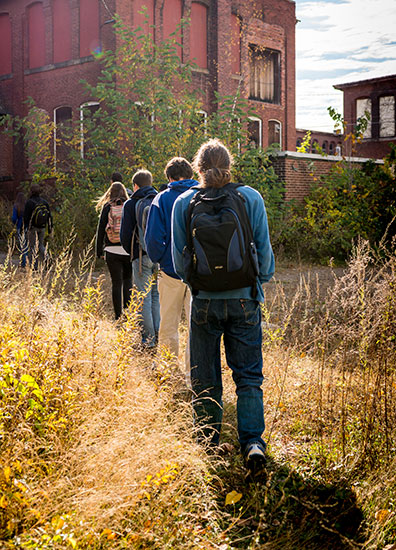Colby-Sawyer College Receives Grant to Support Environmental Stewardship and Service Learning
Colby-Sawyer is pleased to announce it has received a $3,000 Campuses for Environmental Stewardship sub-grant from a four-state Campus Compact Coalition. These funds, awarded to the Coalition by the Davis Education Foundation, are intended to train an interdisciplinary team of faculty at each participating campus to design and implement courses which include service-learning components focused on environmental stewardship.
Colby-Sawyer’s grant will bolster ongoing innovative projects by students and faculty in its Sustainable Learning Initiative (SLI). The SLI is an experiential learning opportunity for Colby-Sawyer students to explore, design and develop sustainable solutions to real and evolving community needs in the nearby city of Franklin, N.H. In fall 2016, the college intends to introduce a new three-year B.S. in community-based sustainability, which is also tied to the sustainable revitalization efforts in Franklin.
This spring, Associate Professor of Environmental Studies Harvey Pine will dedicate a portion of the grant to developing a service-learning component in ENV 333: Fundamentals of Biogeochemistry. “Students will need to create presentations and other materials that inform residents about how the program works, potential chemical threats and remediation techniques in an informative manner utilizing easy-to-understand language,” he writes in the proposal to the grant committee.
Bill Spear, associate professor of Business Administration, incorporated service learning into his Sales and Strategic Marketing class last semester; his students worked on marketing for CATCH Neighborhood Housing Project. This spring, his Consumer Behavior and Market Research students will identify factors for success as CATCH remodels its RiverBend Mill into a 45-unit residential building.
Assistant Professor of Social Sciences and Education Kate Turcotte will work with PermaCityLife, a nonprofit organization dedicated to improving Franklin’s downtown community, the economy and environment, to assess the “intersection of the personal, social, economic and environmental well-being of residents in Franklin.” Her sociology students will visit Franklin and examine its facilities, parks and other resources, and contribute to the city’s understanding of a broad vision of sustainability that encompasses all aspects of life.
Jen White ’90, director of Sustainability and assistant professor of Environmental Studies, says the funds will support the college’s evolving Sustainable Learning Initiative, which provides students hands-on opportunities to learn professional skills while solving real-life challenges. At the end of the spring semester, students will present their results to community stakeholders in Franklin and faculty will attend a regional best-practices conference in September to relate their experiences.
About Campus Compact
Campus Compact is a national coalition of nearly 1,100 colleges and universities committed to the public purposes of higher education. They are a network comprising a national office and 34 state and regional Campus Compacts. As the only national higher education association dedicated solely to campus-based civic engagement, Campus Compact enables campuses to develop students’ citizenship skills and forge effective community partnerships. Their resources support faculty and staff as they pursue community-based teaching and scholarship in the service of positive change.
